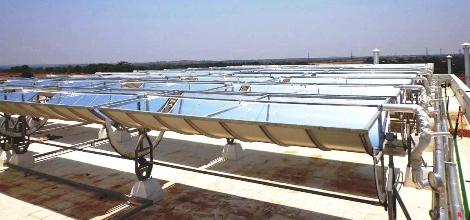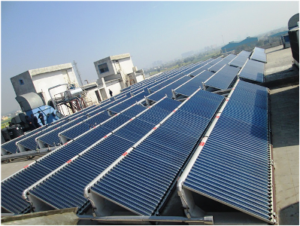India: Solar System Suppliers Call for Solar Process Heat Obligation
November 11, 2015
 The Indian industry imports 80 % of the oil it consumes for heating, boiling, drying or other purposes. The government of India has spent USD 112.748 billion in financial year 2014-15 on the import of these 189.43 million tons of crude oil. Solar thermal is seen as a key technology for reducing government spending and greenhouse gas emissions in the industry on the subcontinent. Despite being heavily subsidised, solar process heat installations are still rare across the country. Now, the solar thermal industry is calling for additional regulations in form of a Renewable Heating Obligation to speed up the deployment of solar thermal technology in the manufacturing sector. The photo shows a solar concentrating system on the roof of bearing manufacturer SKF Technologies in Mysore in southern India.
The Indian industry imports 80 % of the oil it consumes for heating, boiling, drying or other purposes. The government of India has spent USD 112.748 billion in financial year 2014-15 on the import of these 189.43 million tons of crude oil. Solar thermal is seen as a key technology for reducing government spending and greenhouse gas emissions in the industry on the subcontinent. Despite being heavily subsidised, solar process heat installations are still rare across the country. Now, the solar thermal industry is calling for additional regulations in form of a Renewable Heating Obligation to speed up the deployment of solar thermal technology in the manufacturing sector. The photo shows a solar concentrating system on the roof of bearing manufacturer SKF Technologies in Mysore in southern India.Photo: Jaideep N. Malaviya
Stakeholders in the Indian solar thermal sector proposed a decree which would stipulate that all industries use process heat to cover at least 5 % of their energy demand by renewables and, in particular, by solar thermal. Thermax India, the largest supplier of heating and vapour absorption cooling equipment, has been repeatedly making the case for such an obligation at every solar thermal event over the last years. Non-compliance with the decree should result in penalties as proposed by the solar thermal industry sector.
Equal opportunities for solar thermal technologies
Devinder Kaushal of Inter Solar Systems, India’s largest supplier of commercial low-temperature solar thermal systems, refers to the successful Renewable Purchase Obligation, which is one of India’s major growth drivers regarding renewable power generation, and calls on the government to elevate solar thermal to equal importance. Power distributing companies must cover at least 10 % of the traded kilowatt hours by renewable sources, including 1 % by solar electricity. Kaushal emphasises that solar thermal technologies save nearly four times as much energy per area as solar PV and that this should be enough to prove it’s worth investing in it.
It seems that MNRE is now seriously considering the proposal. During a recently organised MNRE event on solar thermal process heat in the dairy industry, a high level officer favoured the idea of a renewable heating obligation for the industry and assured the participants that this option would be thoroughly examined.
Convert solar process heat into electricity units to receive Renewable Energy Certificates
One crucial point will be the measuring of usable solar heat at manufacturing plants, since solar thermal energy is not fed into a central grid like solar electricity is. Dharmendra Gor, Chairman of Taylormade Solar Solutions, a manufacturer of concentrating solar collectors, counters the argument, saying that it is possible to directly co-relate energy output by converting thermal heat to electrical units displaced. There will have to be a mechanism involved to identify the annual energy saved with solar process heat installations and directly convert it into equivalent electrical units of measurement, which can translate into Renewable Energy Certificates. Project developers could then bundle up solar thermal systems and their renewable energy project and bring it into the fold of renewable obligation to sell the certificates to utilities or other large energy consumers. However good the idea of a renewable heat obligation may be for the industry, the path leading to an effective obligation is still long. If all goes well, India would likely be the global frontrunner in non-residential renewable heat obligations.


